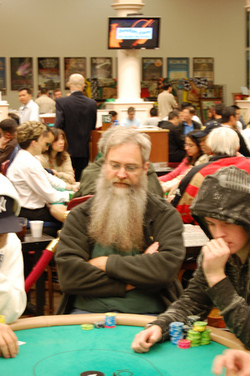 “Look Good” | Photo Credit: Joker Poker
“Look Good” | Photo Credit: Joker Poker “Or Not” | Photo Credit: waldo483This column is written for those of you who have more than a passing familiarity with tournament poker, either through playing in or watching them on TV. For those of you who do not, read on anyway. Perhaps you will be motivated to learn this fascinating, alluring, frustrating game. If you know even a little about tournament poker, you know a few basic things.
“Or Not” | Photo Credit: waldo483This column is written for those of you who have more than a passing familiarity with tournament poker, either through playing in or watching them on TV. For those of you who do not, read on anyway. Perhaps you will be motivated to learn this fascinating, alluring, frustrating game. If you know even a little about tournament poker, you know a few basic things.
First, it is a game of demanding skill, a complex and subtle game that requires intelligence, focus and emotional stability.
Second, it differs from regular cash game play because you cannot replenish your chip stack. If you go broke you’re done, out, finished. Hence, you have to protect your chip stack and you need to adjust your strategy based on how many chips you have at any point in the tournament.
Third, it is a game with a significant luck factor. In the long run skill trumps luck. In the short run an awful lots of fluky things can (and will) happen. You can be a 10 – 1 favorite in a hand and you can (and will) lose often enough to break your heart and, if you’re not careful, your spirit. This feature, of course, poker shares with virtually every other competitive endeavor. Even the best football team can lose to a lesser opponent – all it takes is a tipped pass.
Because of those factors, it is very difficult to make the final table of a poker tournament, let alone win one.
Last night I made the final table at a medium-sized tournament at my local card room. The buy-in was modest but enough to get your juices flowing. There were about 110 or so entrants; some were excellent players, some so-so and some rank amateurs, the ones jokingly called “dead money.”
I made the final table in a manner that isn’t terribly unusual but it’s worth reviewing simply because the sequence of events tells a tale. So, to make the final table you:
a) Sit for an hour and a half and only play one hand —- but make sure you win it. I know, this sounds silly. It isn’t. You can’t change the cards you’re dealt. You just try to play them the best you can. Make the right decisions and hope things break your way. My cards, in a word, “sucked” – hand after hand after hand. It gets boring to pick up 8,2; K,4; 9,6; 7,2 … for 90 minutes. I saw one decent hand, J,J. Raised, got one caller. Bet on a raggedy flop and got called. Bet the turn when more junk hit. He folded. This, actually, was enough so that after 90 minutes of “ugly” I still had nearly 75% of my starting stack.
b) Begin stealing after even the most flat-lined opponents see that you are so tight that they can hear the eagle squawk when you pick up a quarter. Most of your opponents are pretty savvy. They’re watching you – just like you’re watching them. When we got close to the two-hour mark I started opening pots with raises and raising limpers. My cards were a bit better but mainly I was exploiting my image as someone very tight who only played premium cards. In short, I was getting ‘respect.’ c) Fold decent hands. I dumped A,Q to an all-in raise with no qualms. I think I may have been best but it was early and I saw no reason to go broke. I raised with 5,5 but folded to a big re-raise. He flashed me 4,4. I didn’t care. There is no shame in folding. He made a nice play. I made the right decision. That’s all that counts.
d) Get a couple of nice hands at the right time. This is a piece of the “luck” factor. As the blinds go up the pressure increases and you have to start taking down some decent sized pots or you’re going to get “stacked.” Having that run of awful cards at the beginning wasn’t so bad. I could survive with junk because it was still cheap to play. The middle part of a tournament is where it will be useful to be able to stack some chips.
e) Come over the top twice against “grandma.” By grandma I mean any weak player. However, in this tournament it really was (someone’s, not mine) grandma. I could feel guilty but, what the heck, it’s poker! Beside, I’m probably older than her and I needed her chips. Besides, she was a classic tough broad of a grandma and wouldn’t have felt at all unhappy if she got mine. But, tough or not, she was a bit tentative. Twice she tried to limp into pots before me. Both times I raised her all-in. She folded both times. If you’re wondering what I held on those two hands you don’t understand poker.
f) Shove all-in with A,2 out of the Small Blind against the table’s weakest player in the Big Blind when we’re on the “bubble” (that is, knock out one more player and we all cash). I want to steal the blinds and antes. I do NOT want to be called. As it turned out he woke up with a real hand and after some agonizing says, “oh hell, the break’s coming up, I call” and turns up A,J. My hand is “dominated.” I am in trouble. I have a few more chips than he does but I am looking at being crippled and becoming the “bubble boy.”
g) Hit a deuce on the river. The flop was K,K,9; the turn a 6 and I was hoping for a minor miracle: another 6 or 9 so that we split the pot. The dealer burns and turns and the river is the true miracle: one of the three remaining deuces. We’re all in the money.
And that’s the way it goes. You play your best, make what you think are the right decisions, be aggressive, shift gears, watch the others, take advantage of situations, be sensitive to position and, yeah, get lucky. To make the final table you’re going to have to do all of these and get lucky a couple of times.
About two hours later we were down to three players and we agreed on a chop. The big chip leader got a larger share and me and grandma (yup, like I said, tough old broad) split the rest.
So, you want to make the final table? Go ahead. I just told you what to do. Piece of cake.